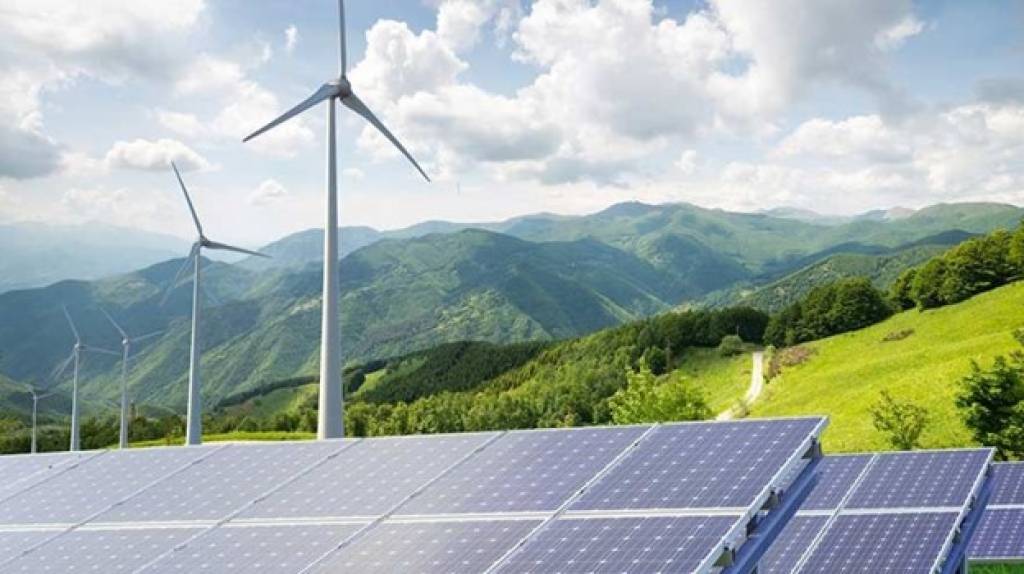
In recent years, Uzbekistan has been steadily implementing an ambitious environmental agenda, positioning itself as a regional leader in addressing key green challenges in Central Asia. This strategic direction is rooted in the initiatives of President Shavkat Mirziyoyev, aimed at restoring the Aral Sea ecosystem, transitioning to green energy, strengthening water diplomacy, actively engaging in international climate forums, and promoting environmental education among youth.
One of the country’s foremost environmental priorities is the rehabilitation of the desertified territories of the Aral Sea region. The Aral Sea crisis, triggered by unsustainable irrigation practices, has devastated the area, making its resolution a top priority. At Uzbekistan’s initiative, the Multi-Partner Human Security Trust Fund for the Aral Sea Region was established in 2018. This fund brings together the efforts of states and international partners to coordinate projects that mitigate the consequences of the environmental and humanitarian disaster. Within a short time, the fund mobilized over $26.1 million (in 2019-2020), with contributions from the governments of Uzbekistan, Norway, Finland, the Republic of Korea, Japan, the UAE, and the European Union. Under the fund’s framework, projects are being implemented to improve healthcare, expand access to drinking water, promote sustainable agriculture, and support reforestation efforts.
At the national level, Uzbekistan established the International Innovation Center for the Aral Sea Region in 2018, tasked with introducing green technologies to the dried seabed. The center conducts experimental plantings of salt-tolerant species such as saxaul, tamarisk, and wild plum while attracting investment. One of its notable initiatives is the crowdfunding platform “My Garden in the Aral Sea”, which allows individuals to contribute to tree planting on the former seabed – just one dollar per seedling. The goal is to plant 100,000 trees by the end of the year. At the same time, the scope of the national “Green Zone” program is expanding, with plans to plant 1 billion trees. Over 2 million hectares of saline land in the Aral Sea region have been rehabilitated, significantly reducing air pollution from harmful particles.
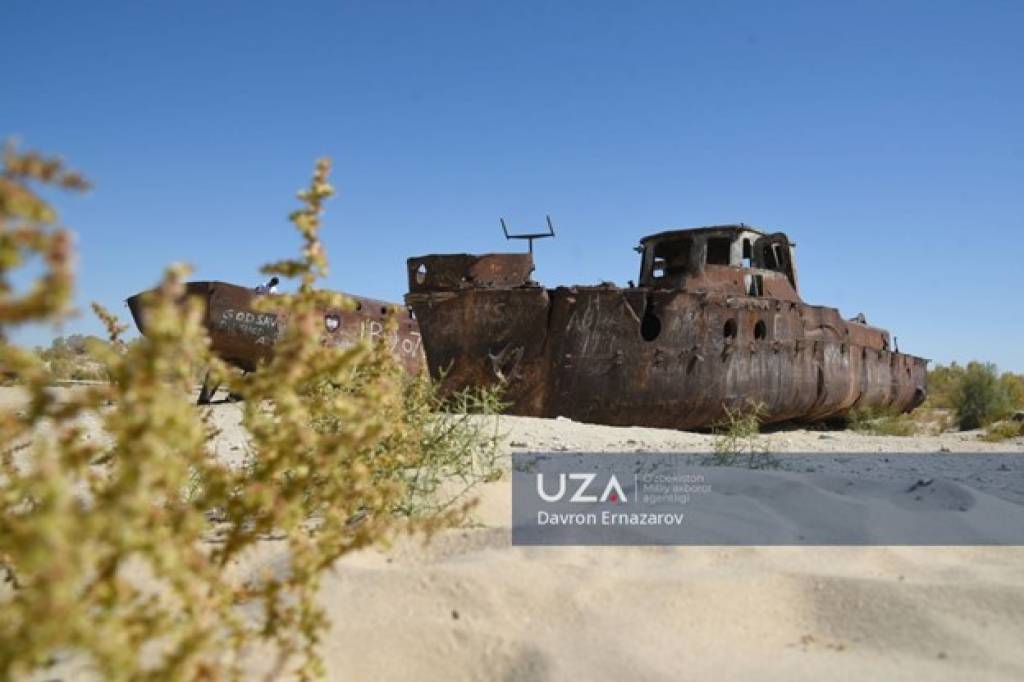
In May 2021, at the initiative of President Shavkat Mirziyoyev, the United Nations General Assembly adopted a resolution declaring the Aral Sea region a zone of environmental innovations and technologies. Co-sponsored by more than 60 countries, the resolution calls for developing environmentally sound technologies in the region and supporting regional programs focused on restoration and innovation. The restoration program has received backing from the UN, the European Union, and major international financial institutions, including the European Investment Bank, the World Bank, and the Asian Development Bank.
Tangible improvements are already evident: air quality is improving in Karakalpakstan, areas once dominated by salt flats are now home to saxaul and tamarisk forests, and biodiversity is rising. In December 2023, the UN adopted a new resolution titled “Central Asia Facing Environmental Challenges”, reinforcing the principle of regional solidarity in addressing the Aral Sea crisis and other ecological threats.
Conclusion: Through state-led programs, innovative projects, and international cooperation, Uzbekistan is effectively addressing the consequences of the Aral catastrophe and transforming the region from a zone of ecological disaster into one of sustainable development.
Renewable Energy Development and International Partnership
Uzbekistan is pursuing an active green energy policy: by 2030, it aims to generate 40-54% of its electricity from clean energy sources. Achieving this target will require the creation of approximately 25 gigawatts of new renewable energy capacity. Under the leadership of President Shavkat Mirziyoyev, significant progress has already been made. The share of alternative energy generation has doubled, and by 2023, nearly $20 billion in foreign investment had been attracted to the energy sector, resulting in the commissioning of 9.6 gigawatts of modern energy facilities. Among these are 14 solar and wind power plants with a combined capacity of 3.5 gigawatts and two energy storage systems of 300 megawatts each, all built with the support of international partners.
A key foreign investor is Future Energy Company PJSC (Masdar) from the United Arab Emirates. In November 2024, at the COP29 Conference in Baku, Uzbekistan and Masdar signed an agreement to build the 1-gigawatt “Mingbuloq” wind power plant in Navoi region. The project is expected to generate around 3.5 billion kilowatt-hours of clean energy annually and save 1 billion cubic meters of natural gas annually. The Mingbuloq site represents the first phase of a larger strategy: Masdar has previously signed agreements for three wind power projects – Mingbuloq, Akpetki in Karakalpakstan, and Buzobay in Navoi – with a total capacity of 2 gigawatts. In addition, Masdar won a tender to construct a 250-megawatt solar power plant with a 63-megawatt storage system in Bukhara region. This project, financed by the World Bank, International Finance Corporation (IFC), Asian Development Bank (ADB), Japan International Cooperation Agency (JICA), and other donors, will reduce CO₂ emissions by 327,000 tons annually.
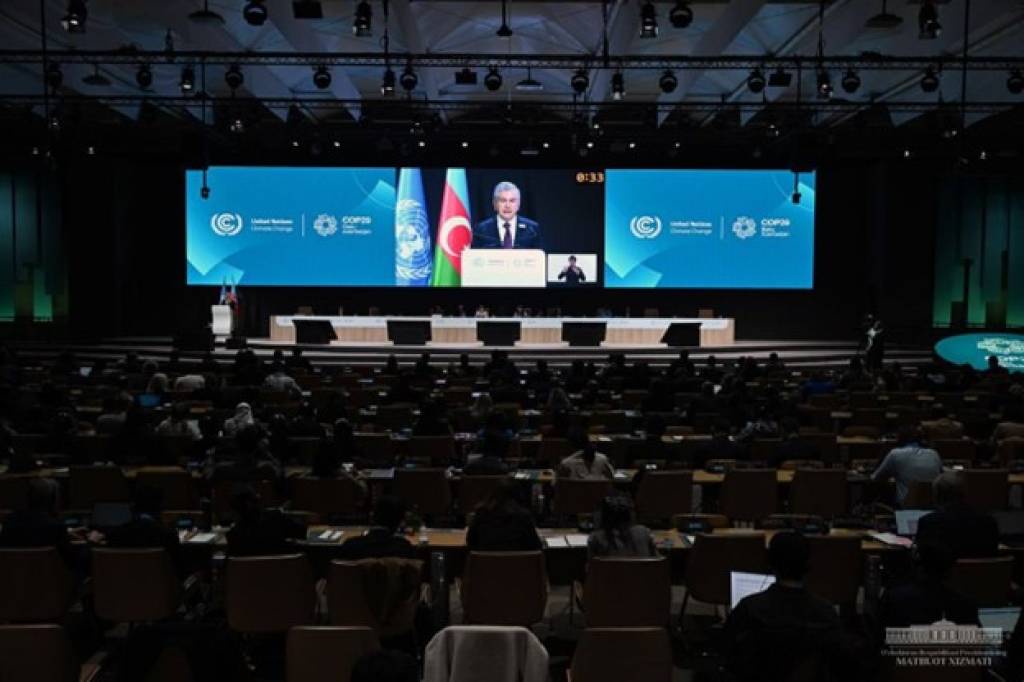
Equally important is Uzbekistan’s national project on green hydrogen. On November 27, 2023, President Shavkat Mirziyoyev, together with Saudi company ACWA Power, inaugurated a pilot plant in Tashkent region for green hydrogen production with a capacity of 3,000 tons per year, along with a connected 52-megawatt wind turbine. Combined with a recently commissioned 1,500-megawatt combined-cycle gas power plant, the project enables efficient use of surplus renewable energy to produce eco-friendly fertilizers while helping address electricity shortages. ACWA Power is currently implementing projects in Uzbekistan totaling $7.5 billion. By 2030, these projects are expected to deliver 25 gigawatts of new renewable energy capacity. According to estimates, this will result in annual savings of over 4.5 billion cubic meters of natural gas and a reduction of 3 million tons of harmful emissions.
Overall, international cooperation has enabled Uzbekistan to establish a strong foundation for green energy. The government, domestic and international banks are implementing loan and grant programs to modernize the power grid and expand renewable energy sources. Notably, the World Bank and the International Finance Corporation (IFC) support the construction of 2,000 megawatts of solar and 500 megawatts of wind power plants by mobilizing private capital. World Bank leadership says these initiatives enhance the country’s energy security and contribute to sustainable economic growth. Thus, Uzbekistan’s comprehensive strategy – from state procurement of renewables to partnerships with foreign investors and financial institutions – has yielded tangible results and gained international recognition.
Water Diplomacy and Transboundary Cooperation
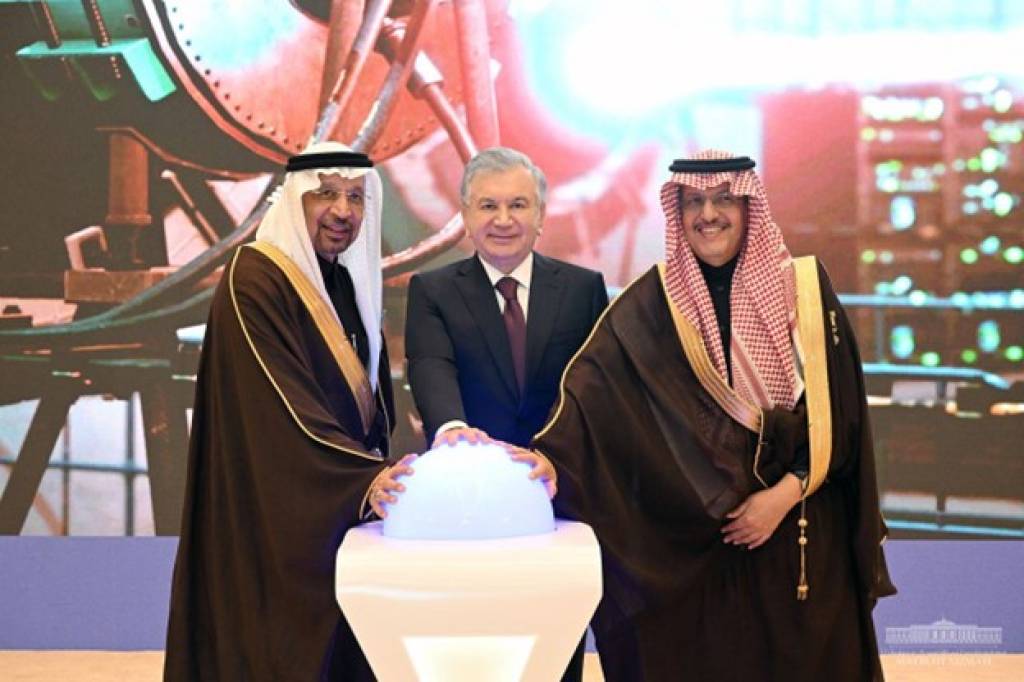
Amid growing climate-related stress, water is becoming a strategically vital resource, and Uzbekistan is taking the lead in promoting water diplomacy in the region. Central Asian countries are working to coordinate water distribution from the Amudarya and Syrdarya rivers. Uzbekistan advocates for open dialogue to prevent conflicts and supports mechanisms for the joint use of water resources. For instance, in April 2024, Tashkent hosted the international scientific and practical forum “Water Diplomacy in Central Asia: Trust, Dialogue, and Multilateral Cooperation for Sustainable Development”. The event, organized by the Institute for Strategic and Regional Studies under the President of the Republic of Uzbekistan in partnership with international organizations, focused on the challenges of sustainable and equitable transboundary water management in climate change.
Uzbekistan also actively encourages Afghanistan’s participation in the C5+1 format (“Central Asian Countries – Afghanistan”) negotiations, including discussions on water-related issues, and deepens cooperation with all neighboring states. As an expert from the International Water Management Institute noted, “Uzbekistan plays a key role and holds significant potential in advancing water diplomacy dialogue between regional countries and Afghanistan”. Under new agreements between Uzbekistan and other Central Asian states, neighboring countries are opening transboundary hydrological monitoring posts, such as those on the Great and Northern Fergana Canals, to enhance irrigation capacity and water management across borders.
According to Uzbekistan experts, the historic agreements on water cooperation were achieved primarily due to Uzbekistan’s initiative and political will. These efforts aim to meet the water needs of the country’s citizens, economy, and future generations. Tashkent advocates for the rational and integrated use of transboundary water and energy resources, emphasizing Central Asia’s ecological sustainability. This commitment is reflected in establishing working groups and regional water councils and active participation in UN and SCO forums, where water efficiency and irrigation innovations are key discussion points. Uzbekistan’s comprehensive approach is closely aligned with national programs on water resource protection and climate change adaptation.
Initiatives at the UN and Climate Forums
Uzbekistan has been actively advancing its environmental initiatives on international platforms. At the UN General Assembly session in September 2017, President Shavkat Mirziyoyev called for collective efforts to save the Aral Sea, eventually leading to UN resolutions focused on the Aral issue. In addition to the 2021 resolution declaring the Aral Sea region a zone of environmental innovation and technology, the UN General Assembly in December 2023 adopted a new resolution initiated by Uzbekistan titled “Central Asia Facing Environmental Challenges: Strengthening Regional Solidarity for Sustainable Development and Prosperity”. The resolution calls on countries in the region to work together to address ecological threats. Uzbekistan has also developed national programs that include commitments to reduce greenhouse gas emissions by 35% by 2030 and to conduct annual climate risk assessments. These commitments are reflected in Uzbekistan’s renewed Nationally Determined Contribution under the Paris Agreement and the Uzbekistan 2030 Strategy.
Uzbekistan’s participation in global climate summits, COP28 in Dubai and COP29 in Baku, has provided a vital platform for advancing the country’s environmental proposals. At COP28 in 2023, President Shavkat Mirziyoyev put forward several key initiatives, including developing a global climate adaptation framework, creating an international fund for loss and damage compensation, and other practical measures to address climate challenges. At COP29 in 2024, the President proposed the establishment of an International Centre for Assessment of Climate Losses and Damage, a regional hub for water-saving technology implementation, and a plant genetic resource bank. These proposals are actively being discussed within the international community. Uzbekistan’s strategic role was also highlighted at the Central Asian Climate Forum held in Samarkand in April 2025. The forum underscored the country’s leadership in promoting an inclusive climate dialogue that brings together regional leaders, the European Union, and the United Nations. Uzbekistan’s core message centers on the transition to a green economy, decarbonization, and the integration of Central Asia as a unified region for addressing environmental challenges.
Uzbekistan’s commitment to environmental sustainability is firmly embedded in its national legal framework. For the first time, the Uzbekistan 2030 Strategy has prioritized climate issues as a key development objective. In alignment with this strategic vision, 2025 has been declared the Year of Environmental Protection and the Green Economy in the country. By 2030, the government aims to implement water-saving technologies across the entire agricultural sector and to green at least 30% of urban areas. Combined with Uzbekistan’s international commitments, these measures reinforce the country’s diplomatic standing as a regional leader in advancing a green development agenda.
International Funds, Environmental Education, and Youth Diplomacy
Uzbekistan is an initiator and a coordinator of international funds and educational programs in the environmental sector. Notably, under the auspices of the United Nations, the Multi-Partner Trust Fund for the Aral Sea Region continues to support sustainable development projects in the region. Beyond this, Uzbekistan actively cooperates with global green finance institutions. At the COP29 Climate Conference in Baku, President Shavkat Mirziyoyev met with the leadership of the Green Climate Fund (GCF) and agreed to expand cooperation. As of autumn 2024, the joint GCF – Uzbekistan project portfolio amounted to $160 million, targeting water resources, renewable energy, and green financing. In addition, two regional projects worth $5 billion and three national projects totaling $500 million were in the planning stage. The upcoming programs include large-scale afforestation initiatives and environmental improvement efforts in the Aral lowlands. International funds actively contribute to developing Uzbekistan’s and the region’s green infrastructure through these partnerships.
A vital area of focus for Uzbekistan is environmental education and youth involvement. The country has established the region’s first green (environmental) university platform and a system for fostering ecological awareness and culture. With support from international partners, the ClimateScience platform – the world’s largest educational resource on climate change – was launched in Uzbekistan in January 2025, now fully available in the Uzbek language. During an open lesson, schoolchildren explored the platform’s content, developing critical thinking skills and a deeper understanding of climate-related issues. To further expand accessibility, educational materials have also been localized into the Karakalpak language, making green education more inclusive across regions and communities.
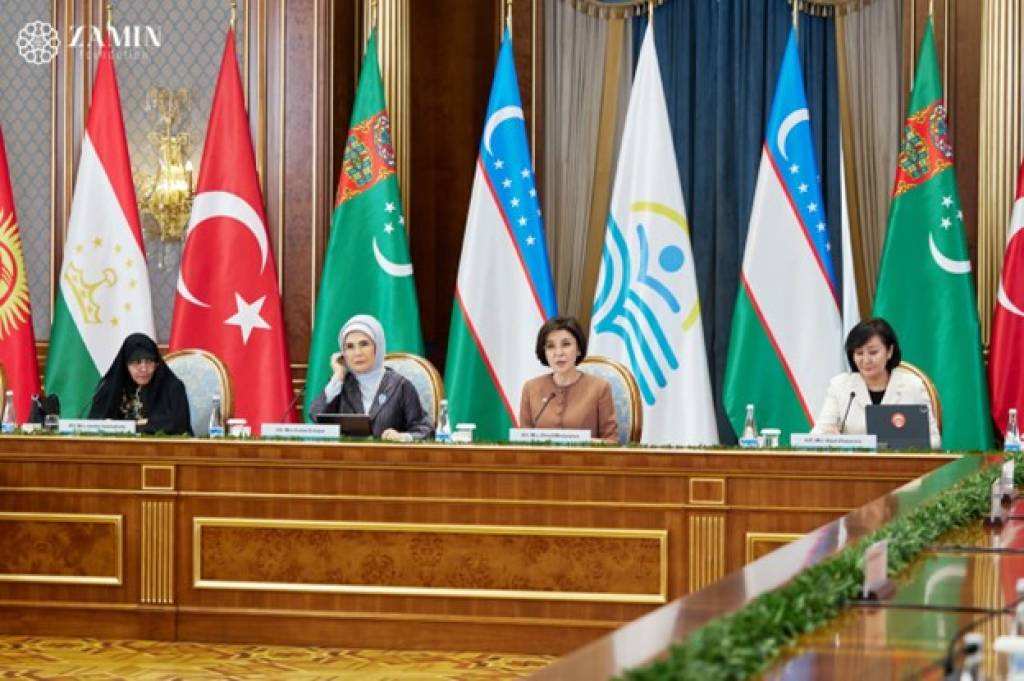
Tashkent is increasingly becoming a venue for youth-focused environmental forums. In November 2023, on World Children’s Day, the city hosted the International Forum “Children and Youth in Action – Climate Change in Central Asia”. Participants from all countries of the region developed a joint strategy through 2030 aimed at promoting environmental literacy and engaging young people in the climate agenda. UNICEF endorsed the strategy. Student and school representatives called on authorities to support innovative youth-led initiatives and involve children in adaptation and sustainable development programs. This approach reflects Uzbekistan’s commitment to fostering a new generation of “green diplomats” and environmentally responsible citizens dedicated to preserving and improving the ecological well-being of their communities.
Today, it can be stated with confidence that Uzbekistan’s leading role in Central Asia’s environmental policy is widely recognized internationally. The country’s far-reaching efforts – from restoring the Aral Sea region and record-breaking afforestation to advancing green economic growth and strengthening water cooperation – reflect the diplomatic vision of President Shavkat Mirziyoyev. Integrating national programs with UN-led initiatives, multilateral funds, and platforms such as the COP climate conferences transforms Uzbekistan into a regional hub for environmental innovation. Experts highlight the country’s achievements: UN resolutions, significant investments in renewable energy, a measurable reduction in harmful emissions, and active engagement of local communities are delivering tangible results.
Thus, Uzbekistan is a leadership model in sustainable development and environmental stewardship, bringing together governments, businesses, and citizens to address the region’s shared challenges.
Abduaziz Khidirov, UzA








